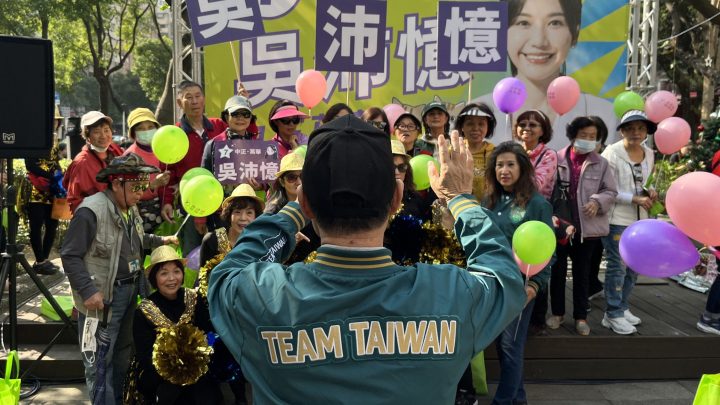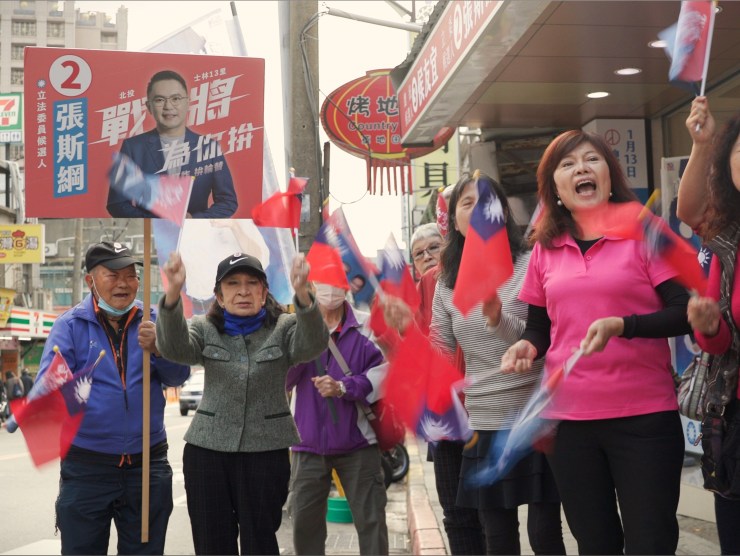
In Taiwan’s election, young voters focus on inflation, wages and war
In Taiwan’s election, young voters focus on inflation, wages and war

Dozens of people at a political rally in central Taipei for the governing Democratic Progressive Party, or DPP, shuffle closer to the stage as a campaign song blares through the speakers.
An elderly man holding a purple balloon moves to the beat of the music. He runs on the spot, strikes a pose, shuffles to one side and strikes another pose.
People at the rally are certainly young at heart but not young. Taiwanese are headed to the polls on Jan. 13 to elect a new president and legislature. Capturing the youth vote is key for any party’s victory.
In the trendy shopping district of Ximending, 25-year-old Tseng Yu Yeh said she has not been paying attention to the political campaigns but she still might vote.
“I’ll likely choose the candidate who talks about improving the economy and increasing salaries,” Tseng said.
Taiwan is a flashpoint in U.S.-China relations. It is a self-governing island with a vibrant democracy, but China claims it as its own and has been running more military exercises in the area recently. Meantime, the U.S. is legally obliged under the 1979 Taiwan Relations Act to supply Taiwan with enough arms to defend itself.
From the outside, geopolitics is key in this election. But in Taiwan, many voters — particularly young ones — feel bread-and-butter issues are just as important.
“This lunch spot I go to used to charge NT$50 ($1.60) for a bento box, but over the last two years it has gone up by 40% to over NT$70 ($2.30),” Tseng said.
While inflation is not as high as in the U.S. — it hit 3% in 2022 — wages in Taiwan have increased too slowly to keep up with higher prices. Taiwan’s average salary in 2022 was 518,000 New Taiwan dollars ($16,600), which was a 2.4% increase from the previous year. Plus, there are big discrepancies between sectors.
“The service sector pays people far too little. The salary for high-tech workers is much higher. The gap between the rich and poor is growing,” said a chef who only gave his surname, Lan. “More and more people can’t afford to rent.”
Rent prices in Taiwan hit a 27-year high last year.

“I hope the new president will build some more social housing,” Lan said.
He is worried about Taiwan’s trade with China and also whether there could ultimately be a war. “I am not very anxious right now, but who knows after the election?”
Tensions with China have already hit certain sectors, like Taiwan’s fruits. Taiwanese industries have also been hurt by U.S. and China tensions.
“Some companies in Taiwan have already started cutting jobs or are in a hiring freeze,” Kuo Jin-han, a tech worker said, adding that this is partly due to fewer orders stemming from poor U.S.-China relations. “When the U.S. imposes chip sanctions on mainland China, [Taiwan’s] exports to China diminish. Less work means fewer staff.”
Voter Mark Wang said Taiwan has been too dependent on chips, or semiconductors, that are used to power everything from smartphones to fighter jets.
“Taiwan is all about hardware and not so much about software,” said Wang, a software worker. “Taiwan doesn’t have a software company that is a global player.”
Down the street, about a dozen members of an opposition party, the Taiwan People’s Party, or TPP, belted out a campaign song. While the governing DPP advocates for a stronger Taiwanese identity, and the main opposition Kuomintang, or KMT, pushes for closer ties with Beijing, the TPP offers a so-called third way.
A TPP volunteer held up a poster in front of me and my team. It read: “Taiwan should be prepared for a war [with China] and thus not fear it; be ready for war but not provoke it.”
Avoiding war is not a top issue in this election for undecided voter Lena Sun.
“Most Taiwanese are not that anxious, because the tensions with China have been going on for a long time. In this environment, young people are a bit tired,” Sun said. “For now, we just want to coexist peacefully.”
While there are differences between these three main parties, Sun feels the candidates are not making their positions clear on the big issues.
“I think many candidates have avoided the topic of Taiwan cutting ties with mainland China,” the 25-year-old said.
KMT, the main opposition, is seen as pro-Beijing, but even this party isn’t calling for unification with China.
College student Lin Chang-min, 22, longs to hear substance from the candidates on bread-and-butter economic issues.
“Most party candidates aren’t talking about how their platforms can improve Taiwan. Instead, they’re yelling about how bad the other parties and their candidates are,” Lin said.
Logistics major Chan Shu Chin wishes politicians would do more for students who are struggling.
“Some parents help with school fees. That’s not easy for them. So, we need to find our own pocket money. I want to concentrate on my studies, but instead I end up studying and working at the same time,” the 21-year-old said. “It’s exhausting being a student.”
Chan is so exhausted that she has not been following the election news.
“I might vote,” she said. “It depends if I have the day off from work or not.”
Additional research by Jonah Khu.
There’s a lot happening in the world. Through it all, Marketplace is here for you.
You rely on Marketplace to break down the world’s events and tell you how it affects you in a fact-based, approachable way. We rely on your financial support to keep making that possible.
Your donation today powers the independent journalism that you rely on. For just $5/month, you can help sustain Marketplace so we can keep reporting on the things that matter to you.
















